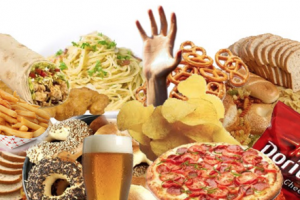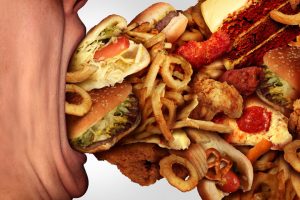Conquering Cravings

Most of us, who were raised accustomed to animal products and cocked foods, will have some withdrawal symptoms when we quit these addictive substances. These symptoms may not be as intense as those from people quitting heroin or crack cocaine, but they’ll probably be noticeable. These reactions may include anything from rashes and night sweats, to mood swings and irritability.
Even those who have been eating a fully raw vegan diet for many years can be tempted by cravings. Sometimes the cravings are for excessive amounts of fatty foods, like avocados and coconut flesh. Other times the cravings are for salt and spices.
Sometimes these cravings are for healthy food, like oranges and bananas, but they come with no signs of hunger. Remember, any desire for food that ain’t caused by true hunger is a craving, even if what we crave is healthy. These types of cravings can appear when we are bored, sad, anxious, or in search for stimulation.
Dealing with cravings is the same at every level. The intensity of the craving may vary from time to time, but our approach to managing it tends to always be the same.
First, we must find the root of the craving. Most often than not, the cause of the craving are emotional triggers resulting from unmet needs. These needs can vary, and include things like affection, human touch, entertainment, fun, safety, and rest. We unconsciously notice the unmet need, and use food as a distraction to push those feelings away.
To conquer our cravings, we must know what is triggering that craving. We must recognize our emotion and the underling need. To know this we need to practice mindfulness, and know ourselves. We also need a great deal of self-love, to accept our needs, and accept that sometimes those needs won’t be met.
Its not enough to recognize, for example, that our craving for chips is rooted in unmet needs for human touch. We must also accept that human touch may not be available when we need it, and that this is not a reason to eat chips. Maybe we need to learn to be with the pain of missing human touch, and find out what lies beyond those unmet needs.
There are more tips, tools, and exercises we can use to overcome cravings. Any good book on handling addiction will have some useful advice.
The following books may not specify much on food cravings, but the tips and exercises offered will surely be useful. These recommendations include “Rewired” by Erica Spiegelman, “Beyond Addiction” by Jeffrey Foote, “Addiction and Grace” by Gerald G. May, “In the Realm of Hungry Ghosts” by Gabor Mate.“ If you want to learn more about getting your needs met, I recommend you read “Non-Violent Communication” by Marshall Rosenberg.
Previous Section:
Next Section:
Acknowledgments


